
Three Types of Preschool Units and Their Impact on Individual Development
Preschool education serves as a pivotal period in the development of young children, laying the groundwork for future learning and life skills. With various approaches to preschool education available, each possesses distinct strengths and weaknesses impacting individual development. Let’s delve into three primary types of preschool units and their effects:
1. Play-Based Learning Units
Play-based learning emphasizes education through play, offering activities like games and puzzles to enhance cognitive, social, and emotional growth. Widely embraced globally, research underscores its positive impact:
- Stimulate creativity and imagination
- Promote social and emotional skills
- Develop problem-solving abilities
- Foster a lifelong love for learning
2. Montessori Units
Montessori education, founded by Maria Montessori, prioritizes independence and self-directed learning. Through personalized plans, children navigate activities at their pace:
- Cultivate independence and self-direction
- Emphasize hands-on learning
- Encourage critical thinking
- Nurture a passion for learning
3. Reggio Emilia Units
Originating in Italy, Reggio Emilia approach underscores child-led learning through exploration and inquiry, promoting creativity and self-expression:
- Encourage creativity and self-expression
- Emphasize exploration and inquiry
- Foster critical thinking skills
- Support a love for learning
Impacts on Individual Development
While all three approaches can positively shape individual development, their specific influences may vary. For instance, play-based learning excels in enhancing social and emotional skills, whereas Montessori education fosters independence. Overall, high-quality preschool education yields numerous benefits:
- Enhanced cognitive development
- Improved social and emotional skills
- Elevated academic achievement
- Boosted creativity and imagination
- Greater self-confidence
The Role of Parental Involvement
Parental engagement significantly contributes to a child’s preschool experience. By actively participating in activities and maintaining communication with teachers, parents can enrich their child’s learning journey:
- Support learning at home
- Volunteer in the classroom
- Ensure effective communication with teachers
The Role of Teachers
Teachers play a pivotal role in fostering individual development. They tailor instruction to accommodate diverse needs, promote social skills, and assess progress effectively:
- Utilize varied instructional strategies
- Facilitate social and emotional growth
- Implement comprehensive assessment methods
Conclusion
Preschool education significantly shapes a child’s future trajectory. By embracing diverse approaches and fostering collaboration between educators and parents, we can ensure that each child receives the support needed to thrive, laying a solid foundation for lifelong success.


